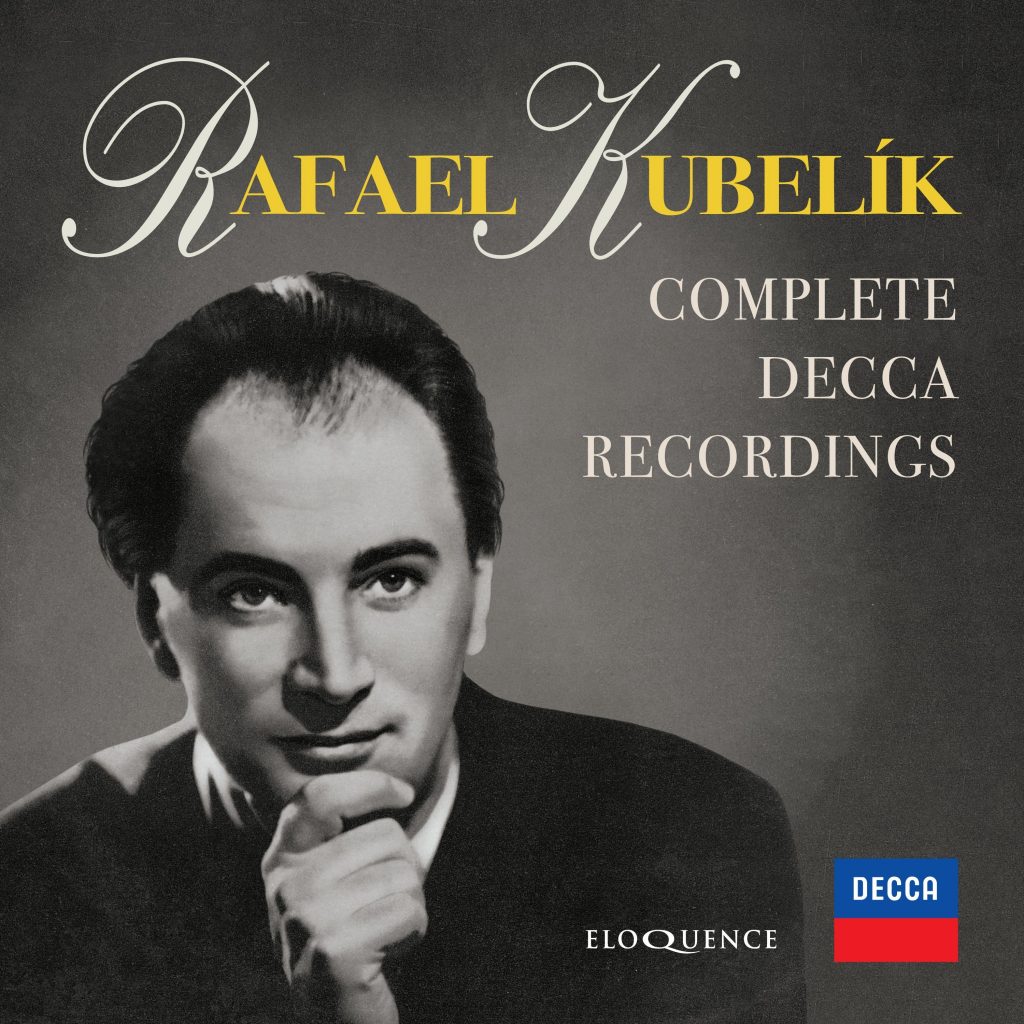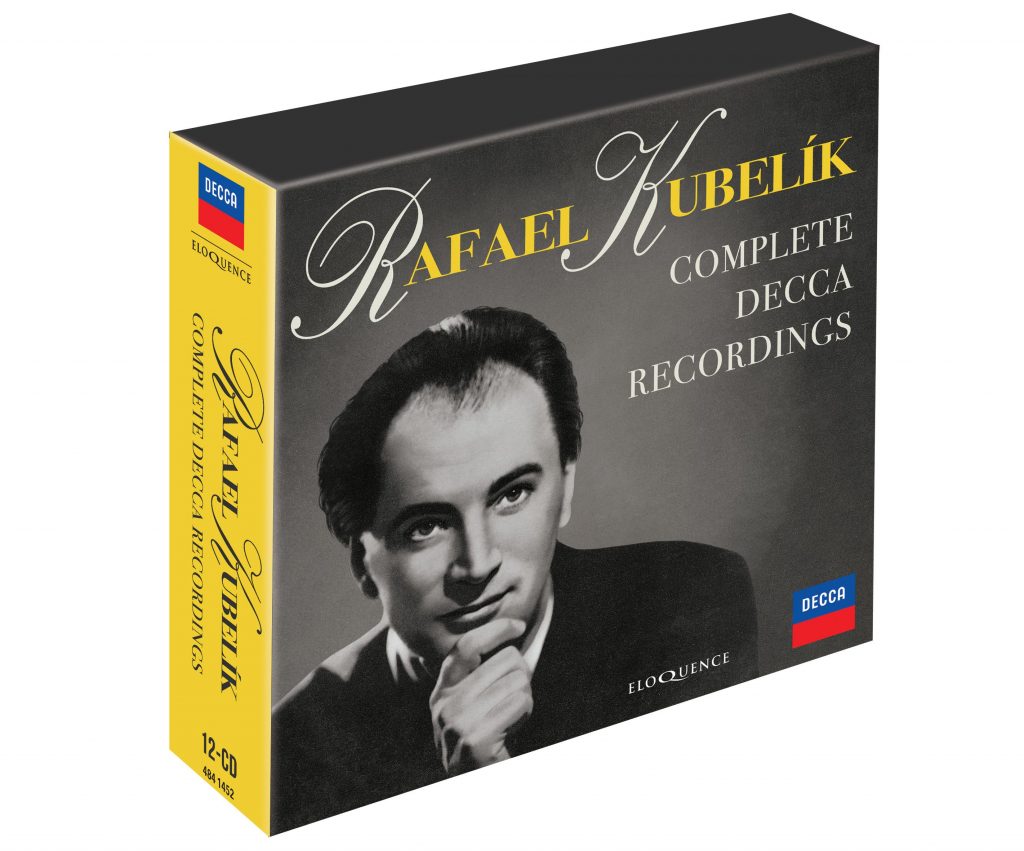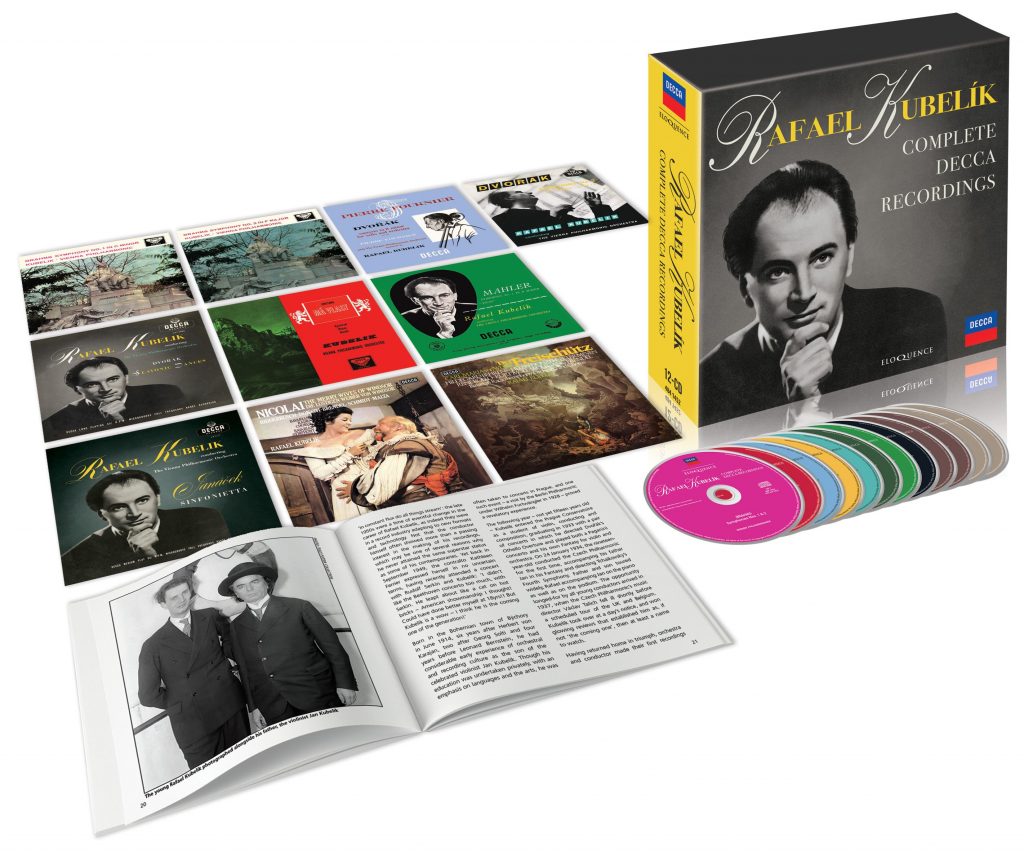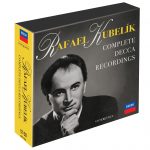Rafael Kubelik, the Czech conductor, was in every way a big man: tall and robust in physique, he was the most generous of human beings and he inspired devoted affection among his friends and colleagues. This complete Decca collection finds Kubelík working with the Wiener Philharmoniker, the Israel Philharmonic, the Symphony Orchestra of the Bavarian Radio, and for a single operatic extract, the Orchestra of the Royal Opera House, Covent Garden. ORIGINAL JACKETS LIMITED EDITION.
Rafael Kubelík had made his debut with the Vienna Philharmonic at the 1950 Salzburg Festival, and together they made a series of recordings during the late 1950s which have long been prized for their warmth and spontaneous-sounding expression. The Mahler First introduced countless listeners to the composer for the first time, as did the Janáček Sinfonietta. After the spectacular success of Kubelík’s first Má Vlast recording, made in Chicago, the Vienna remake is softer edged but no less scored with the nationalistic fervour and colour that made the conductor synonymous with the piece until his death in 1996. Cast in the same mould as the Smetana are the Brahms symphonies and Tchaikovsky’s Romeo and Juliet.
In fact few other label-focused anthologies of Kubelík’s recordings survey so wide a span: a quarter of a century from the Dvořák Cello Concerto with Pierre Fournier in 1954 to the 1979 recording of Der Freischütz, Weber’s foundational work of German Romantic opera, strongly cast in the Decca tradition and led by the radiantly sung Agathe of Hildegard Behrens, then at the start of a career that would soon establish her as the leading Wagnerian soprano of her generation. In this Bavarian Radio appendix to his Decca career, Kubelík made a no less attractive recording of Nicolai’s Merry Wives of Windsor, likewise transferring the atmosphere of the stage into the studio with the experience of decades behind him.
Towards the end of Kubelík’s Vienna years with Decca, he also performed and recorded in Israel. The Decca sessions in a cinema outside Tel Aviv yielded an account of Dvořák’s Serenade for Strings in which critics had no trouble hearing the authentic voice of the Czech nation in exile, embodied in the figure of Kubelík for half a century.
The booklet includes a full contextual account by Peter Quantrill of Kubelík’s Decca career.
CDs 1–2
JOHANNES BRAHMS (1833–1897)
Symphonies Nos. 1–4
Wiener Philharmoniker
CD 3
ANTONÍN DVOŘÁK (1841–1904)
Cello Concerto in B minor, Op. 104
Pierre Fournier, cello; Wiener Philharmoniker
Serenade for Strings in E major Op. 22
Israel Philharmonic Orchestra
CD 4
ANTONÍN DVOŘÁK (1841–1904)
Symphonies Nos. 7 & 9
Wiener Philharmoniker
CD 5
ANTONÍN DVOŘÁK (1841–1904)
Slavonic Dances, Opp. 46 & 72
Wiener Philharmoniker
CD 6
BEDŘICH SMETANA (1824–1884)
Má vlast
Wiener Philharmoniker
CD 7
GUSTAV MAHLER (1860–1911)
Symphony No. 1 in D major
Wiener Philharmoniker
FIRST INTERNATIONAL CD RELEASE ON DECCA
CD 8
LEOŠ JANÁČEK (1854–1928)
Sinfonietta
PIOTR ILYICH TCHAIKOVSKY (1840–1893)
Romeo and Juliet – Fantasy-Overture after Shakespeare
Wiener Philharmoniker
CDs 9–10
OTTO NICOLAI (1810–1849)
Die lustigen Weiber von Windsor
Sir John Falstaff……………..…Karl Ridderbusch
Fluth / Ford…….………………Wolfgang Brendel
Herr Reich / Page……………..…Alexander Malta
Frau Fluth / Mistress Ford…………..Helen Donath
Frau Reich / Mistress Page…….Trudeliese Schmidt
Fenton…………………..…..Claes Haakon Ahnsjö
Junker Spärlich / Slender……………Heinz Zednik
Dr. Cajus……………………………….Alfred Sramek
Jungfer Anna Reich / Anna Page………Lilian Sukis
Chor und Symphonieorchester des Bayerischen Rundfunks
CDs 11–12
CARL MARIA VON WEBER (1786–1826)
Der Freischütz, Op. 77, J. 277
Ottokar…………………….………Wolfgang Brendel
Kuno…………………………….Raimund Grumbach
Agathe.…………………….……..…Hildegard Behrens
Ännchen…………………..…………..Helen Donath
Kaspar………………………………….Peter Meven
Max…………………….……..………….René Kollo
Ein Eremit…………………………………Kurt Moll
Samiel…………..……………………….Rolf Boysen
Kilian………………………………..Hermann Sapell
Jäger…………………….……………Theodor Nicolai
Bridesmaids……………Irmgart Lampart, Adelheid Schiller, Erika Ruggeberg, Renate Freyer
Chor und Symphonieorchester des Bayerischen Rundfunks
HECTOR BERLIOZ (1803–1869)
Ah ! Ah ! Je vais mourir ! … Adieu, fière cité (Les Troyens)
Josephine Veasey, mezzo-soprano; Orchestra of the Royal Opera House, Covent Garden
CD 1
Recording Producers: John Culshaw, Erik Smith (Symphony No. 1); John Culshaw (Symphony No. 2)
Balance Engineers: Gordon Parry; James Brown
Recording Location: Sofiensaal, Vienna, Austria, 23–24 September 1957 (Symphony No. 1), 4–8 March 1957 (Symphony No. 2)
Original Decca Releases: LXT 5417: June 1958, SXL 2013: September 1958 (Symphony No. 1); LXT 5339: December 1957, SXL 2059: January 1959 (Symphony No. 2)
CD 2
Recording Producers: John Culshaw; Erik Smith (Symphony No. 3); Victor Olof, Peter Andry (Symphony No. 4)
Balance Engineers: Gordon Parry; James Brown (Symphony No. 3); Cyril Windebank, James Brown (Symphony No. 4)
Recording Location: Sofiensaal, Vienna, Austria, 28–29 September 1957 (Symphony No. 3), 24–25 March 1956 (Symphony No. 4)
Original Decca Releases: LXT 5419: April 1958, SXL 2104: March 1959 (Symphony No. 3); LXT 5214: October 1956, SXL 2206: June 1960 (Symphony No. 4)
CD 3
Recording Producers: Victor Olof (Cello Concerto); John Culshaw, James Walker (Serenade)
Balance Engineers: Cyril Windebank (Cello Concerto); Gordon Parry, James Brown (Serenade)
Recording Locations: Grosser Saal, Musikverein, Vienna, Austria, 26 June 1954 (Cello Concerto); Tifferet Cinema, Rishon-le-Zion, Israel, April 1957 (Serenade)
Original Decca Releases: LXT 2999: January 1955 (Cello Concerto); LW 5332 [mono]: May 1958, SPA 375 [stereo]: March 1975 (Serenade)
CD 4
Recording Producer: John Culshaw
Balance Engineers: Gordon Parry, James Brown
Recording Location: Sofiensaal, Vienna, Austria, 1–4 October 1956
Original Decca Releases: LXT 5290: March 1957 (Symphony No. 7); LXT 5291: February 1957, SXL 2005: August 1958 (Symphony No. 9)
CD 5
Recording Producers: Victor Olof, Peter Andry
Balance Engineer: Cyril Windebank
Recording Location: Grosser Saal, Musikverein, Vienna, Austria, 7 & 10–11 March 1955
Original Decca Release: LXT 5079–80: September 1955
CD 6
Recording Producers: John Culshaw, Erik Smith
Balance Engineers: Gordon Parry, James Brown
Recording Location: Sofiensaal, Vienna, Austria, 3–7 April 1958
Original Decca Release: LXT 5474–75, SXL 2064–65: June 1959
CD 7
Recording Producer: James Walker
Balance Engineer: Cyril Windebank
Recording Location: Grosser Saal, Musikverein, Vienna, Austria, 27 June 1954
Original Decca Release: LXT 2973: October 1954
CD 8
Recording Producers: Victor Olof, Peter Andry
Balance Engineer: Cyril Windebank
Recording Location: Grosser Saal, Musikverein, Vienna, Austria, 8–9 March 1955 (Janáček), 2–3 March 1955 (Tchaikovsky)
Original Decca Releases: LW 5213: December 1955, LD 9223: November 1956 (Janáček); LXT 5079–80: September 1955, LL1283–84: February 1956 (Tchaikovsky)
CDs 9–10
Recording Producer: Ray Minshull
Balance Engineers: James Lock, Martin Fouqué
Recording Location: Herkulessaal, Munich, Germany, 8–28 March 1977
Original Decca Release: D86D3: March 1978
CD 11, CD 12 (Tracks 1-13)
Recording Producers: Tom Mowrey, Michael Haas
Assistant Producer: Morten Winding
Balance Engineers: Stanley Goodall, Simon Eadon, Martin Atkinson
Recording Location: Herkulessaal, Munich, Germany, 5–17 November 1979
Original Decca Release: D235D3: December 1980
CD 12 (Track 13)
Recording Producer: Christopher Raeburn
Balance Engineers: James Lock; Stanley Goodall
Recording Location: Kingsway Hall, London, UK, February 1968
Original Decca Release: MET 392–93: November 1968, SET 392–393: March 1969
“A first-class version, which may be highly recommended… The recording is brilliant, with a richness equal to Decca’s best.” Gramophone, March 1955 (Dvořák: Cello Concerto)
“Kubelík gets an extremely good performance from the Vienna Philharmonic, and conductor, players and Decca engineers have seen to it that the colours and lines are kept sharp, bright and clear. Every instrument sounds quintessentially itself.” Gramophone, February 1956 (Janáček)
“Kubelík turns in a relaxed, free-flowing reading and he is seconded by superb string playing and sumptuous recorded sound.” Stereo Review, March 1958 (Dvořák: Serenade for Strings)
“An old-fashioned, relaxed performance … There may be more exciting Brahms Thirds on disc, but it is doubtful whether any of them are more genuinely satisfying.” High Fidelity, March 1959 (Brahms, Symphony No. 3)
“Kubelík feels this music deeply. His interpretation is vibrant and exciting. The orchestra plays beautifully and the tone it produces is elegant and rich. London’s stereo offers an envelopment of sound that is simply luxurious.’ Stereo Review, January 1960 (Smetana, Má Vlast)
“A beautifully warm, sane performance from beginning to end… the Vienna Philharmonic is in its best form.” High Fidelity, August 1960 (Brahms, Symphony No. 4)
“Kubelík avoids Kleiber’s tendency to over-emphasise detail … [he] also has the slightly stronger, more consistent cast. Behrens is the most convincing Agathe.” Opera, February 1981 (Weber, Der Freischütz)






